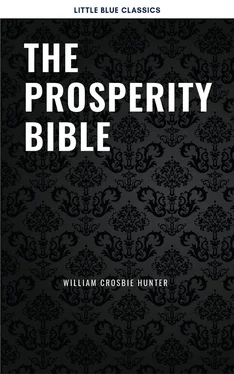19. WRONG SELECTION OF A VOCATION. No man can succeed in a line of endeavor which he does not like. The most essential step in the marketing of personal services is that of selecting an occupation into which you can throw yourself wholeheartedly.
20. LACK OF CONCENTRATION OF EFFORT. The "jack-of-all-trades" seldom is good at any. Concentrate all of your efforts on one DEFINITE CHIEF AIM.
21. THE HABIT OF INDISCRIMINATE SPENDING. The spend-thrift cannot succeed, mainly because he stands eternally in FEAR OF POVERTY. Form the habit of systematic saving by putting aside a definite percentage of your income. Money in the bank gives one a very safe foundation of COURAGE when bargaining for the sale of personal services. Without money, one must take what one is offered, and be glad to get it.
22. LACK OF ENTHUSIASM. Without enthusiasm one cannot be convincing. Moreover, enthusiasm is contagious, and the person who has it, under control, is generally welcome in any group of people.
23. INTOLERANCE. The person with a "closed" mind on any subject seldom gets ahead. Intolerance means that one has stopped acquiring knowledge. The most damaging forms of intolerance are those connected with religious, racial, and political differences of opinion.
24. INTEMPERANCE. The most damaging forms of intemperance are connected with eating, strong drink, and sexual activities. Overindulgence in any of these is fatal to success.
25. INABILITY TO COOPERATE WITH OTHERS. More people lose their positions and their big opportunities in life, because of this fault, than for all other reasons combined. It is a fault which no well-informed business man, or leader will tolerate.
26. POSSESSION OF POWER THAT WAS NOT ACQUIRED THROUGH SELF EFFORT. (Sons and daughters of wealthy men, and others who inherit money which they did not earn). Power in the hands of one who did not acquire it gradually, is often fatal to success. QUICK RICHES are more dangerous than poverty.
27. INTENTIONAL DISHONESTY. There is no substitute for honesty. One may be temporarily dishonest by force of circumstances over which one has no control, without permanent damage. But, there is NO HOPE for the person who is dishonest by choice. Sooner or later, his deeds will catch up with him, and he will pay by loss of reputation, and perhaps even loss of liberty.
28. EGOTISM AND VANITY. These qualities serve as red lights which warn others to keep away. THEY ARE FATAL TO SUCCESS.
29. GUESSING INSTEAD OF THINKING. Most people are too indifferent or lazy to acquire FACTS with which to THINK ACCURATELY. They prefer to act on "opinions" created by guesswork or snap-judgments.
30. LACK OF CAPITAL. This is a common cause of failure among those who start out in business for the first time, without sufficient reserve of capital to absorb the shock of their mistakes, and to carry them over until they have established a REPUTATION.
31. Under this, name any particular cause of failure from which you have suffered that has not been included in the foregoing list.
In these thirty major causes of failure is found a description of the tragedy of life, which obtains for practically every person who tries and fails. It will be helpful if you can induce someone who knows you well to go over this list with you, and help to analyze you by the thirty causes of failure. It may be beneficial if you try this alone. Most people cannot see themselves as others see them. You may be one who cannot.
The oldest of admonitions is "Man, know thyself!" If you market merchandise successfully, you must know the merchandise. The same is true in marketing personal services. You should know all of your weaknesses in order that you may either bridge them or eliminate them entirely. You should know your strength in order that you may call attention to it when selling your services. You can know yourself only through accurate analysis.
The folly of ignorance in connection with self was displayed by a young man who applied to the manager of a well known business for a position. He made a very good impression until the manager asked him what salary he expected. He replied that he had no fixed sum in mind (lack of a definite aim). The manager then said, "We will pay you all you are worth, alter we try you out for a week."
"I will not accept it," the applicant replied, "because I AM GETTING MORE THAN THAT WHERE I AM NOW EMPLOYED."
Before you even start to negotiate for a readjustment of your salary in your present position, or to seek employment elsewhere, BE SURE THAT YOU ARE WORTH MORE THAN YOU NOW RECEIVE.
It is one thing to WANT money – everyone wants more-but it is something entirely different to be WORTH MORE! Many people mistake their WANTS for their JUST DUES. Your financial requirements or wants have nothing whatever to do with your WORTH. Your value is established entirely by your ability to render useful service or your capacity to induce others to render such service.
18
TAKE INVENTORY OF YOURSELF
28 QUESTIONS YOU SHOULD ANSWER
Annual self-analysis is an essential in the effective marketing of personal services, as is annual inventory in merchandising. Moreover, the yearly analysis should disclose a DECREASE IN FAULTS, and an increase in VIRTUES. One goes ahead, stands still, or goes backward in life. One's object should be, of course, to go ahead. Annual self-analysis will disclose whether advancement has been, made, and if so, how much. It will also disclose any backward steps one may have made. The effective marketing of personal services requires one to move forward even if the progress is slow.
Your annual self-analysis should be made at the end of each year, so you can include in your New Year's Resolutions any improvements which the analysis indicates should be made. Take this inventory by asking yourself the following questions, and by checking your answers with the aid of someone who will not permit you to deceive yourself as to their accuracy.
SELF-ANALYSIS QUESTIONNAIRE FOR PERSONAL INVENTORY
1. Have I attained the goal which I established as my objective for this year? (You should work with a definite yearly objective to be attained as a part of your major life objective).
2. Have I delivered service of the best possible QUALITY of which I was capable, or could I have improved any part of this service?
3. Have I delivered service in the greatest possible QUANTITY of which I was capable?
4. Has the spirit of my conduct been harmonious, and cooperative at all times?
5. Have I permitted the habit of PROCRASTINATION to decrease my efficiency, and if so, to what extent?
6. Have I improved my PERSONALITY, and if so, in what ways?
7. Have I been PERSISTENT in following my plans through to completion?
8. Have I reached DECISIONS PROMPTLY AND DEFINITELY on all occasions?
9. Have I permitted any one or more of the six basic fears to decrease my efficiency?
10. Have I been either "over-cautious," or "under-cautious?"
11. Has my relationship with my associates in work been pleasant, or unpleasant? If it has been unpleasant, has the fault been partly, or wholly mine?
12. Have I dissipated any of my energy through lack of CONCENTRATION of effort?
13. Have I been open minded and tolerant in connection with all subjects?
14. In what way have I improved my ability to render service?
15. Have I been intemperate in any of my habits?
16. Have I expressed, either openly or secretly, any form of EGOTISM?
17. Has my conduct toward my associates been such that it has induced them to RESPECT me?
18. Have my opinions and DECISIONS been based upon guesswork, or accuracy of analysis and THOUGHT?
19. Have I followed the habit of budgeting my time, my expenses, and my income, and have I been conservative in these budgets?
Читать дальше












